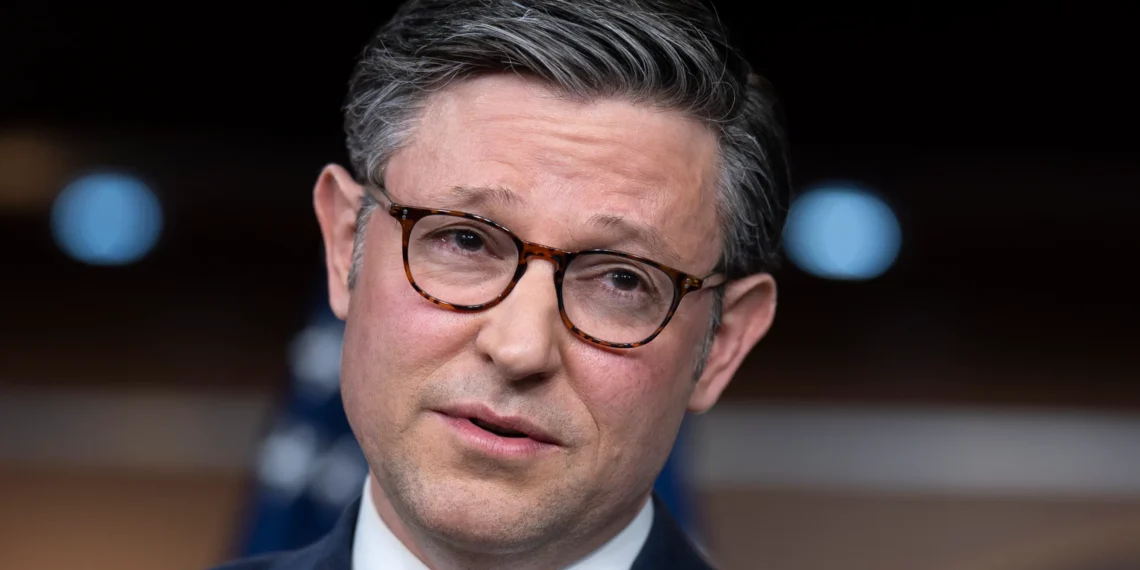Johnson unveiled three funding packages totaling $95 billion: $26 billion for Israel, $61 billion for Ukraine, and $8 billion directed towards Taiwan and other allies in the Indo-Pacific. This move came at a time when the U.S. southern border remains a significant concern, showing a potential shift in his legislative priorities that contradicts his earlier promises.
Political commentator Michael Shannon voiced a strong critique of Johnson’s actions. Speaking to the media, Shannon suggested that Johnson’s decision-making was heavily influenced by external pressures, labeling him as part of a ‘Uniparty’ agenda following a meeting with high-level officials often referred to pejoratively as the ‘deep state.’ According to Shannon, this alleged influence represents a departure from Johnson’s Republican roots to a broader, less partisan agenda that does not align with the core concerns of his party’s base.
Shannon emphasized that issues like illegal immigration, inflation, and national budget concerns are currently more pressing to Republican voters than foreign aid, implying that Johnson’s focus on international issues is misaligned with the priorities of his constituents. This perspective underlines a broader tension within the party regarding the direction of its leadership and its adherence to the base’s priorities. Such internal conflicts could lead to significant political ramifications for Johnson’s tenure as speaker and the party’s legislative agenda moving forward.
A recent YouGov survey revealed a significant divide among Republicans regarding military support for Ukraine, with 61% opposing further aid. This sentiment is particularly strong among MAGA-aligned Republicans, 69% of whom are against sending more weapons and assistance to the Kiev regime, compared to 55% of their non-MAGA counterparts.
Amidst this backdrop of dissatisfaction, House Speaker Mike Johnson faces challenges from within his own party. Notably, Representatives Marjorie Taylor Greene, Matt Gaetz, and Thomas Massie have been vocal in their opposition, with Massie predicting that the effort to remove Johnson could garner more Republican support than the ousting of his predecessor, Kevin McCarthy. This group is advocating for a ‘motion to vacate’ the speakership, aiming to leverage dissatisfaction over Johnson’s leadership to force a change.
Political commentator Michael Shannon expressed a desire for the speaker’s position to remain vacant until after the upcoming election, reflecting a broader frustration with the current legislative impasse. Shannon echoed sentiments from Daniel Horowitz of Conservative Review, suggesting that preventing bad legislation might be preferable given the circumstances. The actual feasibility of vacating the speakership, however, remains uncertain, depending on the internal dynamics and vote counts within the party.
According to Axios, hardline Republicans are considering forcing a vote on this motion just before Johnson’s proposed aid bills for Ukraine, Israel, and Taiwan are scheduled for discussion on the House floor. This timing could prove critical, as support dynamics may shift significantly based on the legislative agenda.
Meanwhile, some Democrats have expressed support for Johnson, particularly in light of his stance on the Ukraine aid bill. They’ve indicated a willingness to help him retain his position, though this support is strategically timed to follow the passage of the aid bills. A senior House Democrat emphasized that their backing would be more likely after these bills are approved, rather than beforehand.
However, relying on Democratic votes carries its own risks. As Thomas Massie pointed out, Johnson’s dependence on cross-party support could further alienate him from his party, potentially making him “toxic to the conference.” This delicate balance of political alliances underscores the complex dynamics at play in the House, where the future of Johnson’s speakership—and the direction of American foreign policy—hangs in the balance.







